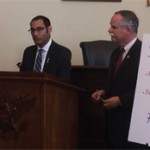
Why do we advocate? The short answer is because it works. But, how do we know it works? How do we really know? Beyond the relationships, recognition from lawmakers and staffers, and hearty greetings each time we walk into an office on Capitol Hill or visit a local office, are we getting somewhere?
To answer that question, let me tell you about the last time I visited Capitol Hill in May with the ACR Board of Directors and committee chairs.
I have been on dozens of Capitol Hill visits on behalf of rheumatology, so I pretty well knew the routine. When I am getting ready for a day of meetings on Capitol Hill and I put the Simple Tasks bent fork on the lapel of my suit, I psych myself up by telling myself that I’m doing the best thing I can be doing that day to make an impact for rheumatology and our patients. The evidence to support this attitude will come later in the day.
Inspiring Speakers to Start the Day
First, the ACR advocates for this visit—board members, committee chairs, and staff—gathered in the hotel lobby, all of us with our bent forks, and made our way to Capitol Hill for a breakfast meeting to hear from the speakers the ACR had lined up to jumpstart our day, before our Hill meetings. The meeting room is a majestic committee hearing room, with a soaring ceiling and imposing chairs for members of Congress, but it seemed almost intimate that morning. We were extremely fortunate that day to hear from congressmen who are actually sponsoring bills that address two of our major issues. Our first speaker was Congressman David McKinley, a Republican from West Virginia, who sits on the powerful Energy and Commerce Committee that handles much of the healthcare legislation that affects rheumatologists and their patients every day.
Bill St.Clair, MD, ACR/REF treasurer and a native of West Virginia who is now settled in at Duke University in Durham, N.C., makes the introduction. Rep. McKinley provided an update on healthcare policy and discussed his bill, the Patients’ Access to Treatments Act (H.R. 4209), which he introduced with Rep. Lois Capps, a Democrat from California. It already has the support of 22 of his colleagues in the House, from both parties. It is the first federal legislation specifically addressing the problem of excessive cost sharing in specialty tiers. It is a major breakthrough for the ACR and for our patients, most of whom can’t afford hundreds—let alone thousands—of extra dollars each month in cost sharing for their necessary, life-changing treatments. It is not likely to make it through Congress this year, but it is an excellent start.
